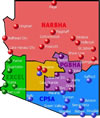Collaborating telemedicine programs in Arizona provide needed telepsychiatry services at cost savings throughout the state. According to Dr. Ronald S. Weinstein, Director of the Arizona Telemedicine Program and former President of the American Telemedicine Association, “telepsychiatry in Arizona is a major success story in mental health”.
Using broadband bi-directional video conferencing, psychiatrists in one location can interact with patients at distant locations. Both patients and psychiatrists have embraced the technology and most feel that it is equivalent to face-to-face encounters. Hundreds of thousands of dollars have been saved in Arizona using telepsychiatry.
NARBHA (the Northern Arizona Regional Behavioral Health Authority) is recognized as a national leader in telepsychiatry and has won three national awards. NARBHA organized RBHAnet which links four regional mental health providers covering the entire state.
In Arizona, the Regional Behavioral Health Authorities (RBHAs) are responsible for providing behavioral health care to every county. Rural RBHAs delivery challenges (large geographic areas, sparse populations, long drive times) drove them to establish RBHAnet. In 1996, the first six RBHA sites came on line with Tobacco Tax and state funding. In 1998, the RBHAnet hub in Flagstaff connected to the Arizona Telemedicine Program Network for statewide cooperation. By 2004, there were 63 RBHAnet video sites in 34 towns and cities across Arizona.
RBHAnet use is on the rise, with a 25 percent increase in total videoconference hours in 2003 compared with the previous year. In the second half of 2003 alone, RBHAnet provided over 4,700 patient services via telemedicine. There was approximately $106,000 in cost savings through the reduction in service providers’ travel expenses and “wind-shield time” which previously required thousands of hours of travel on rural roads by psychiatrists. Telemedicine services include psychiatric evaluations, inpatient staffings with hospitalized patients, consultation, individual and family therapy, case management, and emergency and commitment evaluations.

Telepsychiatrists in Flagstaff (left) and Tucson (right) are preparing to participate in clinical sessions in two different rural communities, hundreds of miles apart. Thousands of telepsychiatry sessions take place in Arizona each year, addressing important needs for behavioral health services in rural areas.
 RBHAnet is also used for RBHA-wide administrative meetings with Behavioral Health Services and for distance education, linking RBHA professionals to Psychiatric Grand Rounds from the University of Arizona College of Medicine in Tucson.
RBHAnet is also used for RBHA-wide administrative meetings with Behavioral Health Services and for distance education, linking RBHA professionals to Psychiatric Grand Rounds from the University of Arizona College of Medicine in Tucson.
The Arizona Department of Corrections (ADC) has also successfully implemented Telepsychiatry services. Contract psychiatrists working at the video-conferencing telemedicine offices of the ADC’s Phoenix office provide telepsychiatry services directly into ten rural prisons throughout the state. Costs and security issues from prisoner transports are minimized.
The University of Arizona College of Medicine’s Psychiatry Department provides critically needed telepsychiatric services to patients at rural hospitals and on the Indian Reservations. Adolescent psychiatry services are provided using wireless telecommunications system directly into the two high schools in Tuba City. University psychiatrists, 300 miles away, deal with teenage depression and other mental health issues without students leaving their schools. These are major success stories in telebehavioral health in Arizona.